人教版八年级上册Unit1 Where did you go on vacation?单元知识点总结
文档属性
| 名称 | 人教版八年级上册Unit1 Where did you go on vacation?单元知识点总结 | 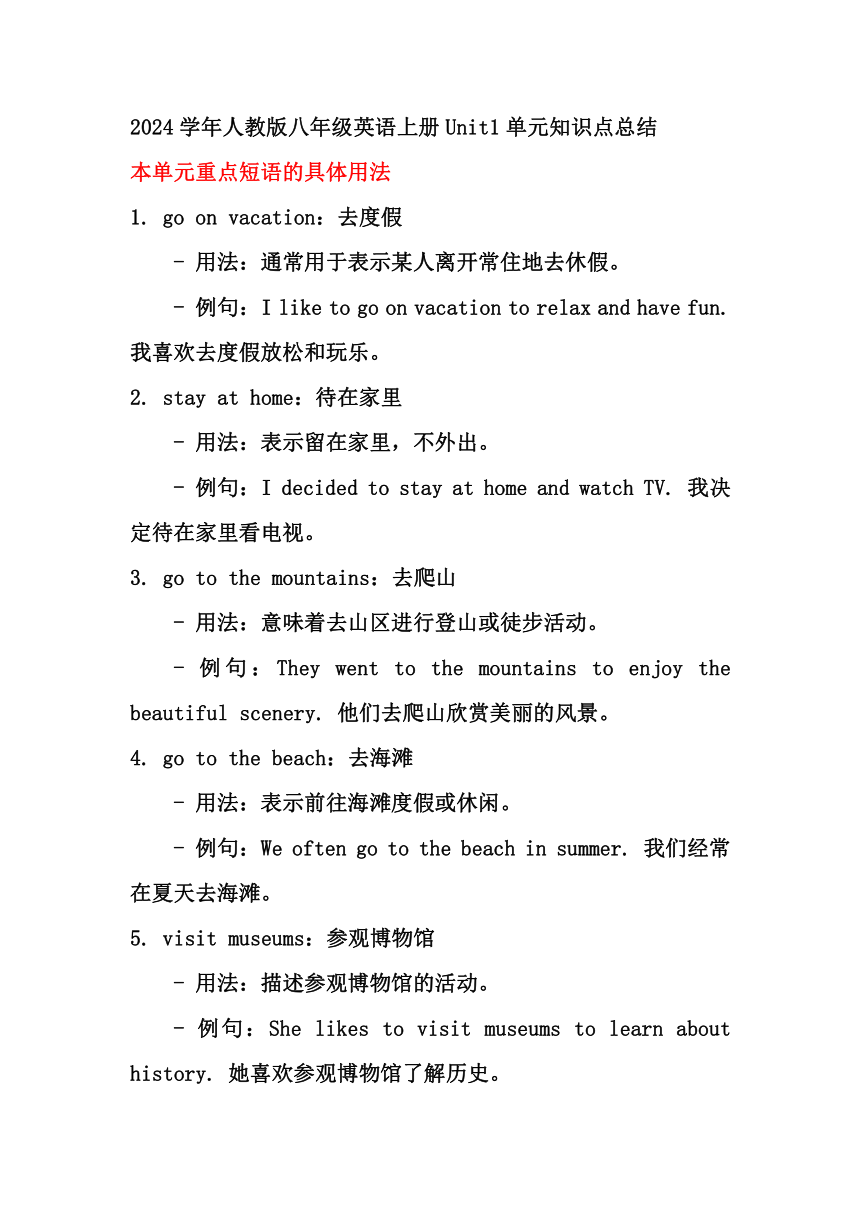 | |
| 格式 | docx | ||
| 文件大小 | 25.7KB | ||
| 资源类型 | 教案 | ||
| 版本资源 | 人教新目标(Go for it)版 | ||
| 科目 | 英语 | ||
| 更新时间 | 2024-02-26 20:38:23 | ||
图片预览

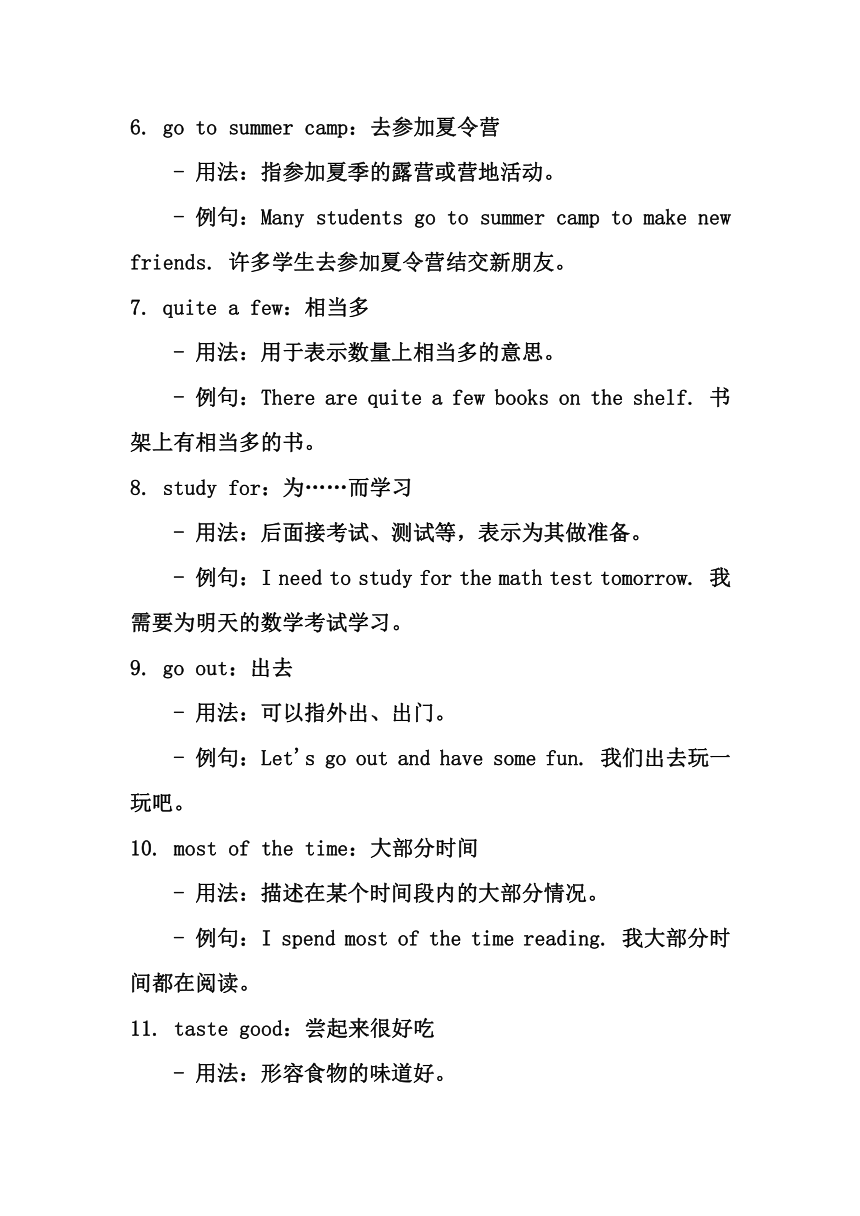
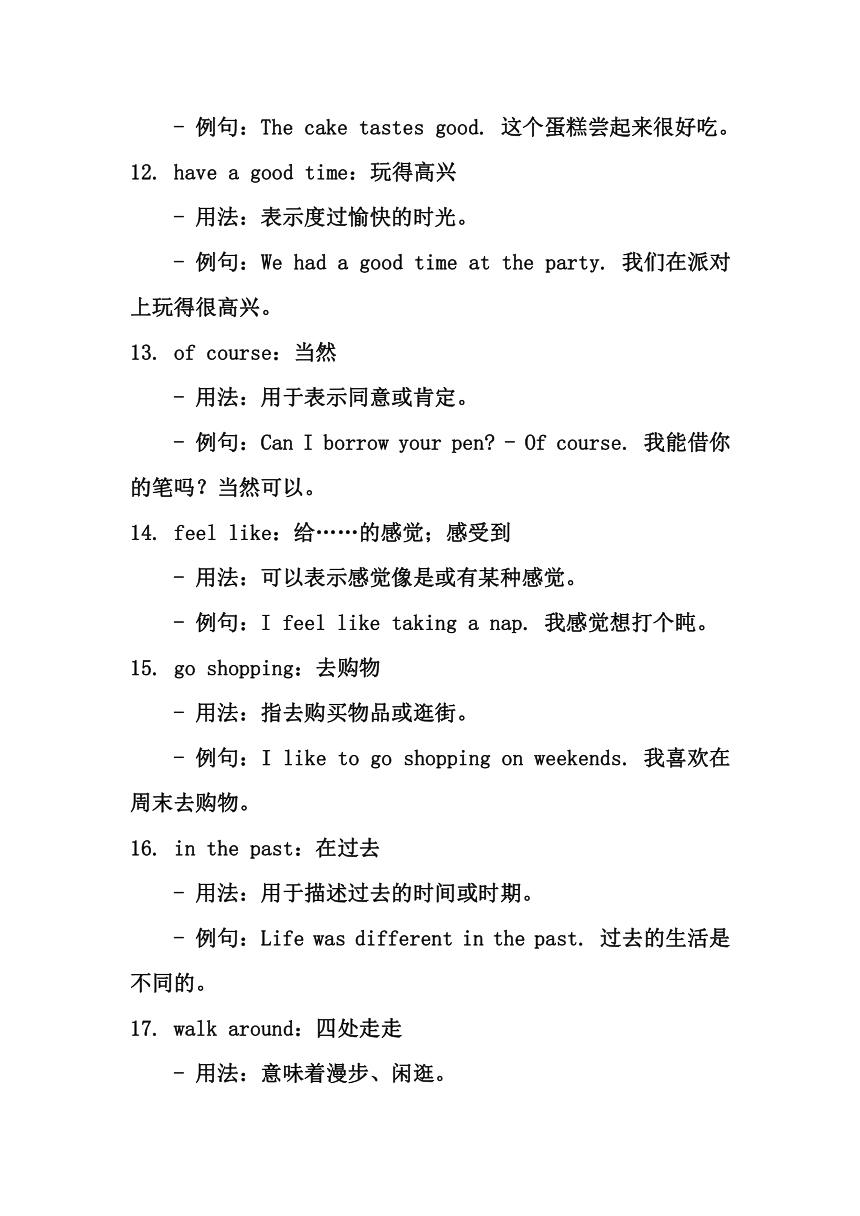
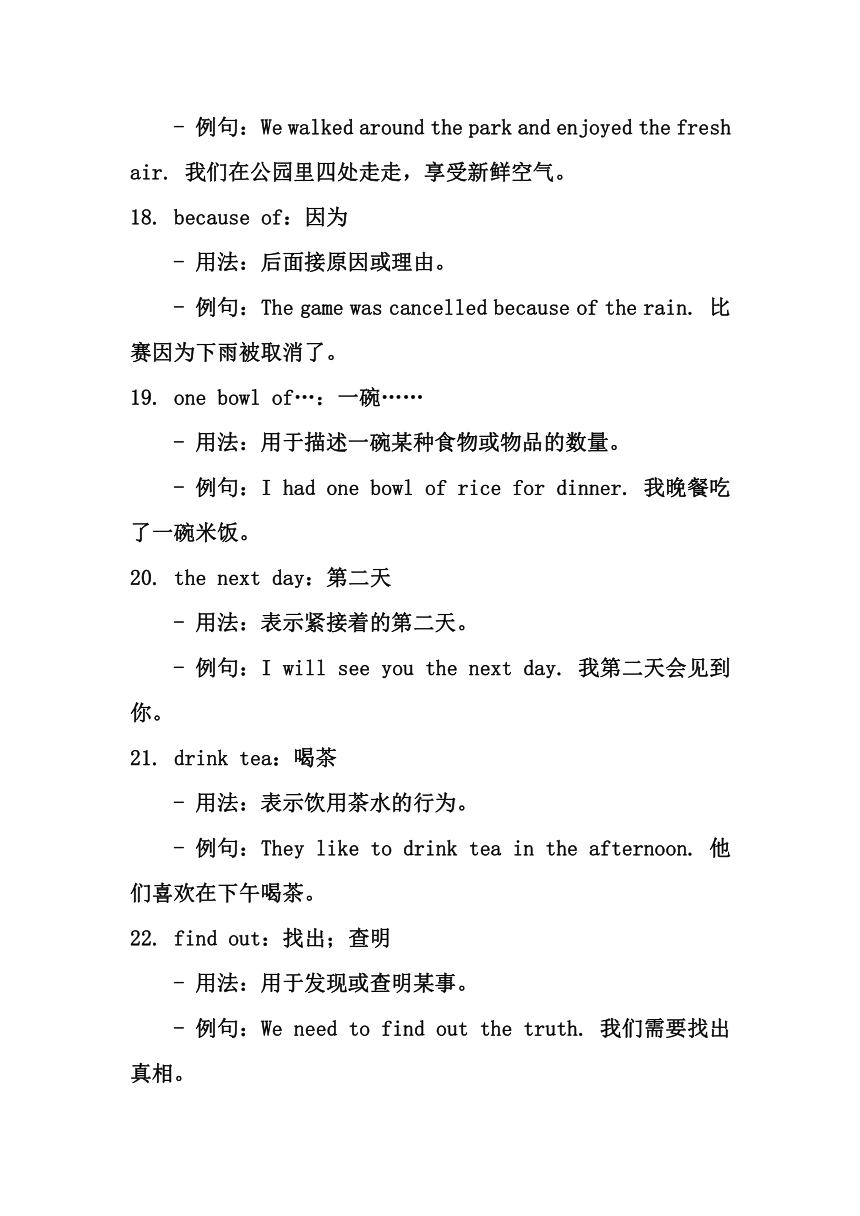
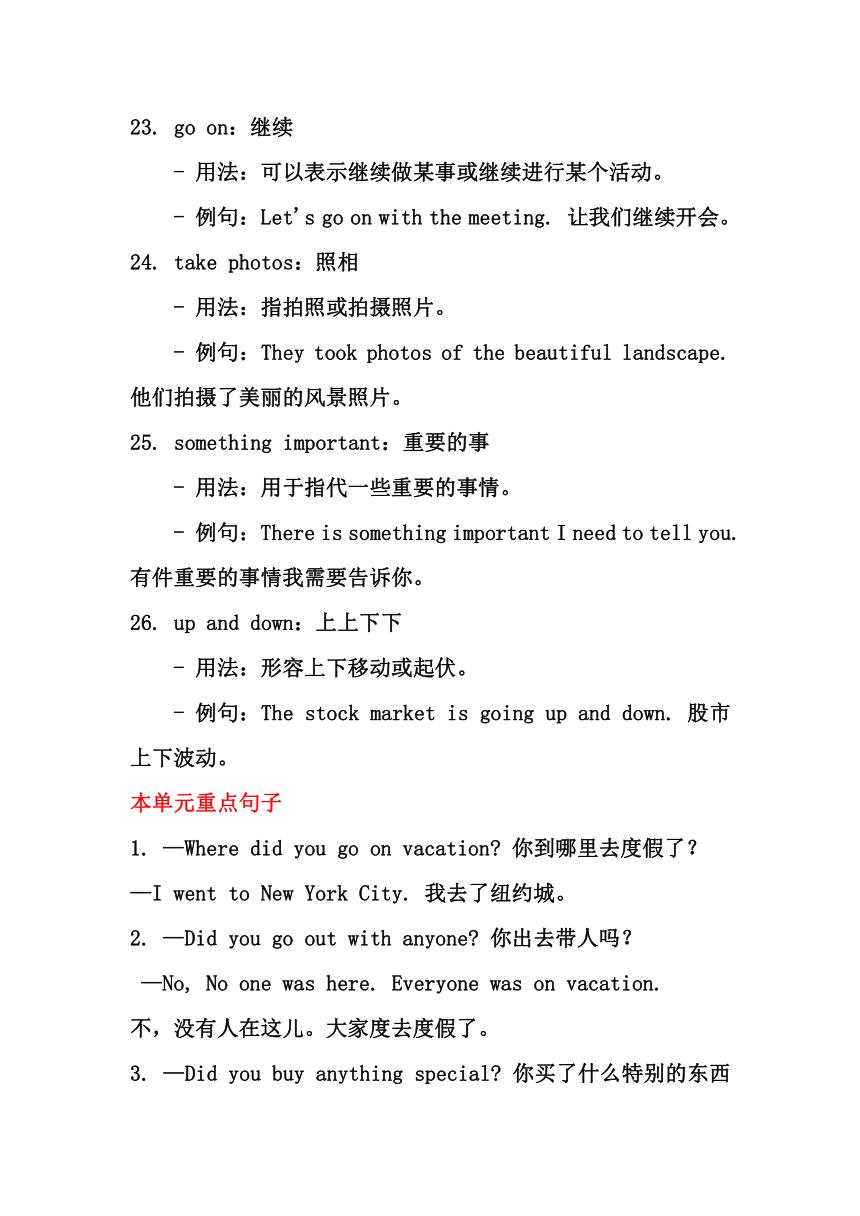
文档简介
2024学年人教版八年级英语上册Unit1单元知识点总结
本单元重点短语的具体用法
1. go on vacation:去度假
- 用法:通常用于表示某人离开常住地去休假。
- 例句:I like to go on vacation to relax and have fun. 我喜欢去度假放松和玩乐。
2. stay at home:待在家里
- 用法:表示留在家里,不外出。
- 例句:I decided to stay at home and watch TV. 我决定待在家里看电视。
3. go to the mountains:去爬山
- 用法:意味着去山区进行登山或徒步活动。
- 例句:They went to the mountains to enjoy the beautiful scenery. 他们去爬山欣赏美丽的风景。
4. go to the beach:去海滩
- 用法:表示前往海滩度假或休闲。
- 例句:We often go to the beach in summer. 我们经常在夏天去海滩。
5. visit museums:参观博物馆
- 用法:描述参观博物馆的活动。
- 例句:She likes to visit museums to learn about history. 她喜欢参观博物馆了解历史。
6. go to summer camp:去参加夏令营
- 用法:指参加夏季的露营或营地活动。
- 例句:Many students go to summer camp to make new friends. 许多学生去参加夏令营结交新朋友。
7. quite a few:相当多
- 用法:用于表示数量上相当多的意思。
- 例句:There are quite a few books on the shelf. 书架上有相当多的书。
8. study for:为……而学习
- 用法:后面接考试、测试等,表示为其做准备。
- 例句:I need to study for the math test tomorrow. 我需要为明天的数学考试学习。
9. go out:出去
- 用法:可以指外出、出门。
- 例句:Let's go out and have some fun. 我们出去玩一玩吧。
10. most of the time:大部分时间
- 用法:描述在某个时间段内的大部分情况。
- 例句:I spend most of the time reading. 我大部分时间都在阅读。
11. taste good:尝起来很好吃
- 用法:形容食物的味道好。
- 例句:The cake tastes good. 这个蛋糕尝起来很好吃。
12. have a good time:玩得高兴
- 用法:表示度过愉快的时光。
- 例句:We had a good time at the party. 我们在派对上玩得很高兴。
13. of course:当然
- 用法:用于表示同意或肯定。
- 例句:Can I borrow your pen - Of course. 我能借你的笔吗?当然可以。
14. feel like:给……的感觉;感受到
- 用法:可以表示感觉像是或有某种感觉。
- 例句:I feel like taking a nap. 我感觉想打个盹。
15. go shopping:去购物
- 用法:指去购买物品或逛街。
- 例句:I like to go shopping on weekends. 我喜欢在周末去购物。
16. in the past:在过去
- 用法:用于描述过去的时间或时期。
- 例句:Life was different in the past. 过去的生活是不同的。
17. walk around:四处走走
- 用法:意味着漫步、闲逛。
- 例句:We walked around the park and enjoyed the fresh air. 我们在公园里四处走走,享受新鲜空气。
18. because of:因为
- 用法:后面接原因或理由。
- 例句:The game was cancelled because of the rain. 比赛因为下雨被取消了。
19. one bowl of…:一碗……
- 用法:用于描述一碗某种食物或物品的数量。
- 例句:I had one bowl of rice for dinner. 我晚餐吃了一碗米饭。
20. the next day:第二天
- 用法:表示紧接着的第二天。
- 例句:I will see you the next day. 我第二天会见到你。
21. drink tea:喝茶
- 用法:表示饮用茶水的行为。
- 例句:They like to drink tea in the afternoon. 他们喜欢在下午喝茶。
22. find out:找出;查明
- 用法:用于发现或查明某事。
- 例句:We need to find out the truth. 我们需要找出真相。
23. go on:继续
- 用法:可以表示继续做某事或继续进行某个活动。
- 例句:Let's go on with the meeting. 让我们继续开会。
24. take photos:照相
- 用法:指拍照或拍摄照片。
- 例句:They took photos of the beautiful landscape. 他们拍摄了美丽的风景照片。
25. something important:重要的事
- 用法:用于指代一些重要的事情。
- 例句:There is something important I need to tell you. 有件重要的事情我需要告诉你。
26. up and down:上上下下
- 用法:形容上下移动或起伏。
- 例句:The stock market is going up and down. 股市上下波动。
本单元重点句子
1. —Where did you go on vacation 你到哪里去度假了?
—I went to New York City. 我去了纽约城。
2. —Did you go out with anyone 你出去带人吗?
—No, No one was here. Everyone was on vacation.
不,没有人在这儿。大家度去度假了。
3. —Did you buy anything special 你买了什么特别的东西吗?
—Yes, I bought something for my father. 对,我给父亲买了一些东西。
4. —How was the food 食物怎么样?
—Everything tasted really good.每一样东西真的都好吃。
5. —Did everyone have a good time 大家玩的开心吗?
—Oh, yes. Everything was excellent.对,一切都很精彩。
6. There was nothing much to do in the evening but read.
晚上除了读书以外无事可做。
本单元重点知识点讲解
1. buy sth. for sb. / buy sb. sth.:为某人买某物
- 用法:这两个短语都可以表示为某人购买某物。
- 例句:
- I bought a present for my friend.(我为我的朋友买了一份礼物。)
- She bought me a book.(她给我买了一本书。)
2. taste + adj.:尝起来……
- 用法:用于描述食物或其他物品的味道。
- 例句:The fruit tastes sweet.(水果尝起来很甜。)
3. look + adj.:看起来……
- 用法:形容人或物的外貌或状态。
- 例句:She looks happy.(她看起来很开心。)
4. nothing…but + 动词原形:除了……之外什么都没有
- 用法:表示除了某个动作或情况之外,没有其他的。
- 例句:He does nothing but play games all day.(他整天除了玩游戏什么也不做。)
5. seem + (to be) + adj.:看起来……
- 用法:表示似乎具有某种性质或状态。
- 例句:He seems tired.(他看起来很累。)
6. arrive in + 大地点 / arrive at + 小地点:到达某地
- 用法:in 后面接大地点,如城市、国家等;at 后面接小地点,如车站、机场等。
- 例句:
- I arrived in Beijing yesterday.(我昨天到达了北京。)
- They arrived at the airport on time.(他们准时到达了机场。)
7. decide to do sth.:决定去做某事
- 用法:表达做出决定要做某事。
- 例句:I decide to learn English well.(我决定学好英语。)
8. try doing sth. / try to do sth.:
- try doing sth. 尝试做某事(强调尝试的过程)
- 例句:I try eating spicy food, but I still don't like it.(我尝试吃辣的食物,但还是不喜欢。)
- try to do sth. 尽力去做某事(强调努力的程度)
- 例句:He tried to pass the exam.(他尽力通过考试。)
9. forget doing sth. / forget to do sth.:
- forget doing sth. 忘记做过某事(事情已经做过,但忘记了)
- 例句:I forget closing the door.(我忘记已经关过门了。)
- forget to do sth. 忘记去做某事(事情还没有做,忘记去做)
- 例句:Don't forget to bring your book.(别忘记带你的书。)
10. enjoy doing sth.:喜欢做某事
- 用法:描述喜欢或享受做某件事情的过程。
- 例句:I enjoy reading books.(我喜欢读书。)
11. want to do sth.:想去做某事
- 用法:表示有做某事的愿望或意图。
- 例句:I want to go swimming this weekend.(我这周末想去游泳。)
12. start doing sth.:开始做某事
- 用法:意味着开始进行某个动作或活动。
- 例句:Let's start working on the project.(让我们开始做这个项目吧。)
13. stop doing sth.:停止做某事
- 用法:表示停止正在进行的动作。
- 例句:Please stop talking and listen to me.(请停止说话听我说。)
14. dislike doing sth.:不喜欢做某事
- 用法:表达对某项活动或行为的不喜欢。
- 例句:She dislikes cooking.(她不喜欢做饭。)
15. keep doing sth.:继续做某事
- 用法:强调持续进行某个动作。
- 例句:Keep practicing and you'll improve.(继续练习,你会进步的。)
16. Why not do. sth. :为什么不做……呢?
- 用法:用于提出建议或提议。
- 例句:Why not go to the park (为什么不去公园呢?)
17. so + adj. + that + 从句:如此……以至于……
- 用法:用于表示程度或结果。
- 例句:The movie was so funny that we laughed all the time.(这部电影太好笑了,以至于我们一直笑个不停。)
18. tell sb. (not) to do sth.:告诉某人(不要)做某事
- 用法:用于指示或建议某人做或不做某事。
- 例句:My teacher told me to pay attention in class.(我的老师告诉我在课堂上要注意。)
本单元重点语法讲解
特殊疑问句:wh-questions: what, who, where, when, which, whose, why, whom等。
特殊疑问句的构成及用法:
结构:特殊疑问词+ 一般疑问句, 即:特殊疑问词+be/助动词/情态动词+主语+谓语/表语(+其他)
疑问代词:
1) Who:谁。做主语,用来指人 Who is the boy under the tree
2)Whom 谁,做宾语,用来指人 Whom are you writing to
3) Whose 谁的,用来指所属关系,如果做定语,一般后接名词 Whose pen is this
4) Which 哪个,哪些,用来指对人或物在一定范围之内进行选择 Which grils will in the sports meeting Which pen is Lily’s
5)What什么,通常指物,也可指人,一般用在没有指出范围的情况下 What can you see in the picture What are you doing now
疑问副词:
When:何时,询问时间 When will she come back
Where何地,询问地点, Where do you come from
Why为什么,询问原因, Why are you late for school
How 如何,询问手段、方式、工具以及程度等 How do you usually go to school
How old多大,询问年龄,How old is Jim’s little brother
How many/much多少,询问数量 How many birds are there in the tree
How far多远,询问距离, How far is it form your home to school
How long多长,多久,询问时间的长度或距离 How long will you stay in Beijing
How often多长时间按一次,询问频率 How often do you go to see your grandparents
How soon多久,询问时间 How soon will you come back
频率副词:表示动作发生的频率,never, sometimes, often, usually, always.
作文训练
【题目要求】假设你的名字叫小明。你很喜欢旅游,你和家人去年夏天去了长城。请以“The visit to the Great Wall” 为题,写一篇不少于80词的英语短文。
【优秀范文】
The visit to the Great Wall
My name is Xiaoming and I like traveling very much. Last summar, I went to the Great Wall with my family.It was fine that day. We went there by bus early in the morning. When we got there, there were many other visitors there. When my family and I went onto the Great Wall, we saw beautiful scenery(风景). We all were amazed(惊讶的) by how beautiful it was. We took quite a few photos there.We had a good time there.The time flew by, and soon we had to go back. I was tired after traveling, but I really enjoyed visiting the Great Wall!
本单元重点短语的具体用法
1. go on vacation:去度假
- 用法:通常用于表示某人离开常住地去休假。
- 例句:I like to go on vacation to relax and have fun. 我喜欢去度假放松和玩乐。
2. stay at home:待在家里
- 用法:表示留在家里,不外出。
- 例句:I decided to stay at home and watch TV. 我决定待在家里看电视。
3. go to the mountains:去爬山
- 用法:意味着去山区进行登山或徒步活动。
- 例句:They went to the mountains to enjoy the beautiful scenery. 他们去爬山欣赏美丽的风景。
4. go to the beach:去海滩
- 用法:表示前往海滩度假或休闲。
- 例句:We often go to the beach in summer. 我们经常在夏天去海滩。
5. visit museums:参观博物馆
- 用法:描述参观博物馆的活动。
- 例句:She likes to visit museums to learn about history. 她喜欢参观博物馆了解历史。
6. go to summer camp:去参加夏令营
- 用法:指参加夏季的露营或营地活动。
- 例句:Many students go to summer camp to make new friends. 许多学生去参加夏令营结交新朋友。
7. quite a few:相当多
- 用法:用于表示数量上相当多的意思。
- 例句:There are quite a few books on the shelf. 书架上有相当多的书。
8. study for:为……而学习
- 用法:后面接考试、测试等,表示为其做准备。
- 例句:I need to study for the math test tomorrow. 我需要为明天的数学考试学习。
9. go out:出去
- 用法:可以指外出、出门。
- 例句:Let's go out and have some fun. 我们出去玩一玩吧。
10. most of the time:大部分时间
- 用法:描述在某个时间段内的大部分情况。
- 例句:I spend most of the time reading. 我大部分时间都在阅读。
11. taste good:尝起来很好吃
- 用法:形容食物的味道好。
- 例句:The cake tastes good. 这个蛋糕尝起来很好吃。
12. have a good time:玩得高兴
- 用法:表示度过愉快的时光。
- 例句:We had a good time at the party. 我们在派对上玩得很高兴。
13. of course:当然
- 用法:用于表示同意或肯定。
- 例句:Can I borrow your pen - Of course. 我能借你的笔吗?当然可以。
14. feel like:给……的感觉;感受到
- 用法:可以表示感觉像是或有某种感觉。
- 例句:I feel like taking a nap. 我感觉想打个盹。
15. go shopping:去购物
- 用法:指去购买物品或逛街。
- 例句:I like to go shopping on weekends. 我喜欢在周末去购物。
16. in the past:在过去
- 用法:用于描述过去的时间或时期。
- 例句:Life was different in the past. 过去的生活是不同的。
17. walk around:四处走走
- 用法:意味着漫步、闲逛。
- 例句:We walked around the park and enjoyed the fresh air. 我们在公园里四处走走,享受新鲜空气。
18. because of:因为
- 用法:后面接原因或理由。
- 例句:The game was cancelled because of the rain. 比赛因为下雨被取消了。
19. one bowl of…:一碗……
- 用法:用于描述一碗某种食物或物品的数量。
- 例句:I had one bowl of rice for dinner. 我晚餐吃了一碗米饭。
20. the next day:第二天
- 用法:表示紧接着的第二天。
- 例句:I will see you the next day. 我第二天会见到你。
21. drink tea:喝茶
- 用法:表示饮用茶水的行为。
- 例句:They like to drink tea in the afternoon. 他们喜欢在下午喝茶。
22. find out:找出;查明
- 用法:用于发现或查明某事。
- 例句:We need to find out the truth. 我们需要找出真相。
23. go on:继续
- 用法:可以表示继续做某事或继续进行某个活动。
- 例句:Let's go on with the meeting. 让我们继续开会。
24. take photos:照相
- 用法:指拍照或拍摄照片。
- 例句:They took photos of the beautiful landscape. 他们拍摄了美丽的风景照片。
25. something important:重要的事
- 用法:用于指代一些重要的事情。
- 例句:There is something important I need to tell you. 有件重要的事情我需要告诉你。
26. up and down:上上下下
- 用法:形容上下移动或起伏。
- 例句:The stock market is going up and down. 股市上下波动。
本单元重点句子
1. —Where did you go on vacation 你到哪里去度假了?
—I went to New York City. 我去了纽约城。
2. —Did you go out with anyone 你出去带人吗?
—No, No one was here. Everyone was on vacation.
不,没有人在这儿。大家度去度假了。
3. —Did you buy anything special 你买了什么特别的东西吗?
—Yes, I bought something for my father. 对,我给父亲买了一些东西。
4. —How was the food 食物怎么样?
—Everything tasted really good.每一样东西真的都好吃。
5. —Did everyone have a good time 大家玩的开心吗?
—Oh, yes. Everything was excellent.对,一切都很精彩。
6. There was nothing much to do in the evening but read.
晚上除了读书以外无事可做。
本单元重点知识点讲解
1. buy sth. for sb. / buy sb. sth.:为某人买某物
- 用法:这两个短语都可以表示为某人购买某物。
- 例句:
- I bought a present for my friend.(我为我的朋友买了一份礼物。)
- She bought me a book.(她给我买了一本书。)
2. taste + adj.:尝起来……
- 用法:用于描述食物或其他物品的味道。
- 例句:The fruit tastes sweet.(水果尝起来很甜。)
3. look + adj.:看起来……
- 用法:形容人或物的外貌或状态。
- 例句:She looks happy.(她看起来很开心。)
4. nothing…but + 动词原形:除了……之外什么都没有
- 用法:表示除了某个动作或情况之外,没有其他的。
- 例句:He does nothing but play games all day.(他整天除了玩游戏什么也不做。)
5. seem + (to be) + adj.:看起来……
- 用法:表示似乎具有某种性质或状态。
- 例句:He seems tired.(他看起来很累。)
6. arrive in + 大地点 / arrive at + 小地点:到达某地
- 用法:in 后面接大地点,如城市、国家等;at 后面接小地点,如车站、机场等。
- 例句:
- I arrived in Beijing yesterday.(我昨天到达了北京。)
- They arrived at the airport on time.(他们准时到达了机场。)
7. decide to do sth.:决定去做某事
- 用法:表达做出决定要做某事。
- 例句:I decide to learn English well.(我决定学好英语。)
8. try doing sth. / try to do sth.:
- try doing sth. 尝试做某事(强调尝试的过程)
- 例句:I try eating spicy food, but I still don't like it.(我尝试吃辣的食物,但还是不喜欢。)
- try to do sth. 尽力去做某事(强调努力的程度)
- 例句:He tried to pass the exam.(他尽力通过考试。)
9. forget doing sth. / forget to do sth.:
- forget doing sth. 忘记做过某事(事情已经做过,但忘记了)
- 例句:I forget closing the door.(我忘记已经关过门了。)
- forget to do sth. 忘记去做某事(事情还没有做,忘记去做)
- 例句:Don't forget to bring your book.(别忘记带你的书。)
10. enjoy doing sth.:喜欢做某事
- 用法:描述喜欢或享受做某件事情的过程。
- 例句:I enjoy reading books.(我喜欢读书。)
11. want to do sth.:想去做某事
- 用法:表示有做某事的愿望或意图。
- 例句:I want to go swimming this weekend.(我这周末想去游泳。)
12. start doing sth.:开始做某事
- 用法:意味着开始进行某个动作或活动。
- 例句:Let's start working on the project.(让我们开始做这个项目吧。)
13. stop doing sth.:停止做某事
- 用法:表示停止正在进行的动作。
- 例句:Please stop talking and listen to me.(请停止说话听我说。)
14. dislike doing sth.:不喜欢做某事
- 用法:表达对某项活动或行为的不喜欢。
- 例句:She dislikes cooking.(她不喜欢做饭。)
15. keep doing sth.:继续做某事
- 用法:强调持续进行某个动作。
- 例句:Keep practicing and you'll improve.(继续练习,你会进步的。)
16. Why not do. sth. :为什么不做……呢?
- 用法:用于提出建议或提议。
- 例句:Why not go to the park (为什么不去公园呢?)
17. so + adj. + that + 从句:如此……以至于……
- 用法:用于表示程度或结果。
- 例句:The movie was so funny that we laughed all the time.(这部电影太好笑了,以至于我们一直笑个不停。)
18. tell sb. (not) to do sth.:告诉某人(不要)做某事
- 用法:用于指示或建议某人做或不做某事。
- 例句:My teacher told me to pay attention in class.(我的老师告诉我在课堂上要注意。)
本单元重点语法讲解
特殊疑问句:wh-questions: what, who, where, when, which, whose, why, whom等。
特殊疑问句的构成及用法:
结构:特殊疑问词+ 一般疑问句, 即:特殊疑问词+be/助动词/情态动词+主语+谓语/表语(+其他)
疑问代词:
1) Who:谁。做主语,用来指人 Who is the boy under the tree
2)Whom 谁,做宾语,用来指人 Whom are you writing to
3) Whose 谁的,用来指所属关系,如果做定语,一般后接名词 Whose pen is this
4) Which 哪个,哪些,用来指对人或物在一定范围之内进行选择 Which grils will in the sports meeting Which pen is Lily’s
5)What什么,通常指物,也可指人,一般用在没有指出范围的情况下 What can you see in the picture What are you doing now
疑问副词:
When:何时,询问时间 When will she come back
Where何地,询问地点, Where do you come from
Why为什么,询问原因, Why are you late for school
How 如何,询问手段、方式、工具以及程度等 How do you usually go to school
How old多大,询问年龄,How old is Jim’s little brother
How many/much多少,询问数量 How many birds are there in the tree
How far多远,询问距离, How far is it form your home to school
How long多长,多久,询问时间的长度或距离 How long will you stay in Beijing
How often多长时间按一次,询问频率 How often do you go to see your grandparents
How soon多久,询问时间 How soon will you come back
频率副词:表示动作发生的频率,never, sometimes, often, usually, always.
作文训练
【题目要求】假设你的名字叫小明。你很喜欢旅游,你和家人去年夏天去了长城。请以“The visit to the Great Wall” 为题,写一篇不少于80词的英语短文。
【优秀范文】
The visit to the Great Wall
My name is Xiaoming and I like traveling very much. Last summar, I went to the Great Wall with my family.It was fine that day. We went there by bus early in the morning. When we got there, there were many other visitors there. When my family and I went onto the Great Wall, we saw beautiful scenery(风景). We all were amazed(惊讶的) by how beautiful it was. We took quite a few photos there.We had a good time there.The time flew by, and soon we had to go back. I was tired after traveling, but I really enjoyed visiting the Great Wall!
同课章节目录
- Unit 1 Where did you go on vacation?
- Section A
- Section B
- Unit 2 How often do you exercise?
- Section A
- Section B
- Unit 3 I'm more outgoing than my sister.
- Section A
- Section B
- Unit 4 What's the best movie theater?
- Section A
- Section B
- Unit 5 Do you want to watch a game show?
- Section A
- Section B
- Unit 6 I'm going to study computer science.
- Section A
- Section B
- Unit 7 Will people have robots?
- Section A
- Section B
- Unit 8 How do you make a banana milk shake?
- Section A
- Section B
- Unit 9 Can you come to my party?
- Section A
- Section B
- Unit 10 If you go to the party, you'll have a grea
- Section A
- Section B
